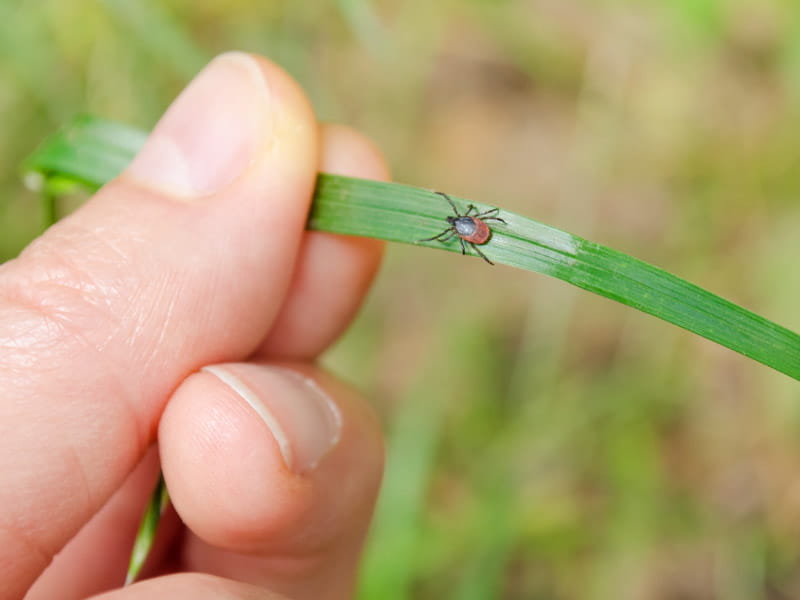This tick season, beware the tiny bugs that can carry Lyme disease – a danger to the heart
By Laura Williamson, American Heart Association News

Warmer weather is drawing people outdoors to enjoy nature. But for those who spend time working in the garden or walking along wooded or grassy trails, it also means greater exposure to a menace so tiny they may never even see or feel it.
Lyme disease – spread by ticks that can be as small as a pinhead – affects at least 30,000 people per year in the United States. According to the Centers for Disease Control and Prevention, certain types of ticks carry the bacteria that causes Lyme disease and are most abundant in the Northeast, parts of the Midwest and some Pacific coast states.
While many people may be familiar with Lyme's hallmark "bull's-eye" rash, the disease can produce other symptoms. These include fever, chills, headache, fatigue, muscle and joint aches, swollen lymph nodes – even heart problems. Left untreated, Lyme infections also may spread to the nervous system.
Lyme carditis is a rare but serious complication, occurring in roughly 1 in 100 Lyme cases reported to the CDC each year. It occurs when bacteria from the infection enter the heart, causing inflammation and interfering with electrical signals going from the upper to lower chambers.
This creates an irregular heartbeat known as heart block, which can be as mild as small and barely noticeable pauses between heartbeats, or as severe as a skip of many heartbeats that can cause chest pain, said Dr. Richard Shen, an infectious disease specialist at Southcoast Health in southern Massachusetts.
"It can be difficult to notice unless it's really bad," Shen said. Heart block can even resolve on its own. However, in rare cases, it can be fatal and should not be left untreated.
In addition to the typical symptoms of Lyme disease, people with Lyme carditis may experience lightheadedness, fainting, shortness of breath, heart palpitations or chest pain.
Diagnosing the condition involves a blood test to detect Lyme disease and an electrocardiogram to see if it has affected the heart, Shen said. Lyme carditis is typically treated with a three-week course of oral or intravenous antibiotics, but a temporary pacemaker may be needed in some cases.
The type of treatment depends on the severity of the symptoms, said Dr. Kevin Shah, director of the cardiovascular intensive care unit at the University of Utah in Salt Lake City.
Sometimes, a person experiencing irregular heart rhythms might not realize they have Lyme disease, Shah said. He encourages testing for Lyme before surgically inserting a pacemaker – especially if the person is young. "There's a chance they may need just a few weeks of antibiotics for it to resolve."
The best way to prevent Lyme carditis or Lyme disease is to stay away from places with ticks that carry the bacteria or take precautions when walking in areas where ticks are abundant, Shen said.
People who work outdoors – such as landscapers, farmers, grounds maintenance workers and people in the foresting industry – face a higher risk of exposure.
Dogs also are susceptible to tick bites and may carry ticks into the home. They should be checked for ticks after spending time outdoors, especially around the tail, in and around the ears, under the collar, between the legs and the toes. A veterinarian can recommend the best tick prevention products for dogs and other pets that spend time outdoors.
To prevent tick bites to people, guidelines from the Infectious Disease Society of America, American Academy of Neurology and American College of Rheumatology recommend using insect repellants with ingredients such as DEET, permethrin or lemon eucalyptus oil. Once a tick attaches to skin, they recommend against trying to burn it off or using chemicals or petroleum products to remove it. Instead, ticks should be removed with clean, fine-tipped tweezers.
Shen said finding a tick on your skin – even if it's already bitten you – does not mean you will automatically get Lyme disease.
"Lyme requires the tick to be biting on the person for a day or two before it can transmit," he said. "Do tick checks every day after you've been outside. Pick them off. If you can do that before they stay on too long, you should be able to avoid Lyme disease pretty well."





